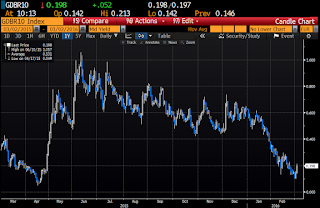| Last | Change | Percent | |
| S&P Futures | 1971.8 | -6.1 | -0.31% |
| Eurostoxx Index | 3002.6 | 6.2 | 0.21% |
| Oil (WTI) | 33.81 | -0.6 | -1.72% |
| LIBOR | 0.633 | -0.002 | -0.31% |
| US Dollar Index (DXY) | 98.48 | 0.129 | 0.13% |
| 10 Year Govt Bond Yield | 1.86% | 0.04% | |
| Current Coupon Ginnie Mae TBA | 105.3 | ||
| Current Coupon Fannie Mae TBA | 104.5 | ||
| BankRate 30 Year Fixed Rate Mortgage | 3.81 |
Stocks are lower this morning after yesterday's strong rally. Bonds and MBS are down.
Mortgage Applications fell 4.8% last week as purchases fell 0.6% and refis fell 7.2%.
The ADP Employment change came in stronger than expected at 214k jobs. The Street is forecasting an increase of 195k payrolls for Friday's jobs report. All of the activity was in the services sector, as the manufacturing sector lost about 9,000 jobs and the financial sector added only 8,000.
Chart: ADP jobs
The ISM New York Index fell slightly to 53.6
Donald Trump and Hillary Clinton were the big winners on Super Tuesday. You can probably stick a fork in Sanders at this point. For the GOP, the question is whether Donald Trump is a plurality winner or a majority winner. The establishment is hoping that once they coalesce around a single candidate, the numbers will swing to that candidate. If they go the brokered convention route, Trump will almost certainly run as an independent, which guarantees a Clinton landslide.
Yesterday was a bloodbath in Treasuries, with the 10 year yield increasing about 9 basis points to 1.82%. The 2 year yield increased 7 basis points. If we see strong wage growth on Friday's jobs report, we could see further weakness in Treasuries.
To put the current 1.85% 10 year yield in perspective: when the Fed hiked rates last December, the yield was 2.3%. That said, the fact that interest rates are falling globally will prevent Treasuries from falling too much. Note the German 10 year Bund is close to the sub 10 basis point lows of last spring, and currently yields 18 basis points. The Japanese Government 10 year bond yield is negative 5 basis points. Global investors look at Treasuries yielding more than Italian, Spanish, and Irish bonds and see relative attractiveness, especially since the US is about the only country not trying to devalue its currency. That should help keep a lid on rates.
Chart: German Bund Yield
The collapse in global bond yields is sending a signal that the Fed isn't going to ignore - that deflation remains a threat. Janet Yellen has pledged to let the labor market "run hot" for a while and that means letting wage growth run. The big question is what happens to the labor force participation rate. If these workers come back, that will prevent too much wage inflation and will be ultimately better for the economy in the longer term. If they don't, then look for wage inflation to begin and the Fed to move earlier.


No comments:
Post a Comment